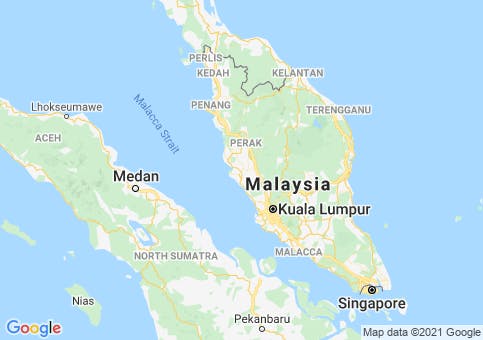For years, many people from surrounding countries, Indonesia, Thailand, Hong Kong, and Singapore, have come to Malaysia for affordable, high quality healthcare. All the doctors speak English and most were trained in the UK, U.S., or Australia, so they are familiar with western standards of care. Also, many of the hospitals in Kuala Lumpur and Penang are JCI accredited, meaning that they are considered to meet the gold standard in healthcare throughout the globe.
More than 1 million foreigners seek treatment in the hospitals in Penang and Kuala Lumpur every year. There are specialists in every hospital, but unlike in the U.S., you don’t have to wait for months to get an appointment. Just turn up to the hospital, register, then take a number and wait your turn. If you are then referred to another doctor, or need to get an X-ray or scan, that will also happen on the same day in the same place.
Prescriptions in Malaysia cost a fraction of what you pay at home. But it’s not just the cost that’s attractive; it’s the service. The pharmacists, like the rest of Malaysia’s medical staff, are well trained and informed. Malaysians are friendly people, but it’s the genuine interest that they take in you, no matter how small or large the issue, which impresses. It takes you back to a time when personal service meant something. That same service is alive and well here.
There are doctor’s clinics throughout the country, which are perfect places to get treatment for something minor like a cold, the flu, or sinus infections. They usually charge $10 and because these are small clinics you won’t have to wait as long as you would in a busy hospital. But for anything more serious, it’s best to go to a specialist or general practitioner in one of the many top-notch hospitals in the country. A first-time doctor or specialist visit is usually between $15 to $40, with follow-up visits around $15, depending of course on what you have to have done. If you are admitted, the overnight stay will cost roughly $40 for a private room per night.
This figure is based on a stay at a not-for-profit hospital and there are some very good ones in Malaysia. The Lam Wah Ee Hospital in Penang is one such hospital and value for money and care, you couldn’t do better.
Many of the hospitals offer health screening packages which include a physical, chest X-ray, ECG, blood work (43 different tests), abdomen ultrasound, and a vision test. More specific tests can be added on but the basic package starts at less than $70. The Lam Wah Eee Hospital, even as a not-for-profit hospital, offers packages as well, and you can add on or take off things that you like. For instance, all of their packages include a chest x-ray, but if you have just had one you can request that it’s taken off and they will reduce the cost of the package accordingly. For women, if you would like a pap smear or a mammogram as additional to the package you have chosen they can tag it on. These flexible packages are very popular with expats and locals alike.
Dentistry in Penang is just as high quality. Just like the doctors, most are schooled in the west and all of them speak English. The technology is the same, and in some cases more advanced than at home, depending on the office you go to. Cleanings start at $25 at a modern office with state of the art equipment, and it’s only $28 for a filling. Porcelain crowns start at $350, something that would cost you $1,600 back home.
There is a two-tier healthcare system in Malaysia; government-run universal healthcare and a co-existing private healthcare system. Expats can choose whatever hospital they want and pay out of pocket if they don’t have insurance. Most expats choose to go to the private hospitals (which tend to be more expensive), instead of the public ones and will still save money when they pay out of pocket for most minor visits. Private health insurance is available, and many expats take out policies for any major health issues. International insurance companies like AIG, BUPA, and Cigna offer various plans for expats—some include medical coverage while you travel as well.
Private health insurance in Malaysia isn’t something that you should shy away from either as it is totally affordable. The most basic coverage will cost you just $400 per year and cover things like a colonoscopy to most operations. It’s only in the west, and the U.S in particular where insurance companies charge the earth. The reality is, in Asia, health care is affordable.
Great Healthcare at a Low Cost in Malaysia

There’s so much to love about island life in Penang, Malaysia, that it’s hard to know where to start. My wife and I spend just $2, 500 a month to live here, and that’s renting a 2,300 square foot apartment with an ocean view and eating out regularly at some of the island’s amazing restaurants. Most of the time we eat at local places, they are outstanding, and when we want western food we cook at home. The standard of living here is high, the cost not so much.
There are plenty of sandy beaches to stroll on, jungle trails to explore, and the historic colonial architecture is unique, seen nowhere else in the world. The British East India Company arrived in Penang in 1786, bringing Chinese and Indian, laborers, builders, and tradespeople with them. This resulted in homes that were similar to what were being built in India, but with the Chinese, Indian pinch, utterly unique to Penang. English is widely spoken throughout the entire country, and there are friendly and open expat communities no matter where you go.
One of the things we are most grateful for is healthcare, which is among the world’s best—and cheapest. It’s rare we need to use it, but when we do, it’s good to know we’re dealing with the very best doctors and at very low prices. There’s a reason four plane-loads of medical tourists land in Penang every day.
A visit to the dentist for an annual check-up was never a pleasant experience at home, but here it actually is. The staff are friendly, professional, and genuinely happy to see you. My dentist is a lovely Malaysian Chinese woman who was trained in the U.S and the U.K. Her studio is state-of-the art and, as the seat reclines, a flat-screen TV showing Animal Planet episodes magically appears from the ceiling. Your mind is immediately someplace else and you feel yourself instantly relaxing.
A check-up costs $20, and if you include a cleaning, $25. The last time I was there I needed a filling and a cleaning, and that visit came to just $40. In the U.S. this would set me back around $180.
Prescriptions here cost a fraction of what we pay at home. But it’s not just the cost that’s attractive; it’s the service. The pharmacists, like the rest of the medical staff in Malaysia, are well-trained and informed. Malaysians are a friendly people, but it’s the genuine interest that they take in you, no matter how small or large the issue, which impresses.
It takes you back to a time when service meant something. When bank managers used to have a coffee with you and actually cared about your well-being. That same service is alive and well here because they realize that service matters to the customer, it keeps customers coming back, and that if they don’t give it, which they genuinely do, someone else will.











